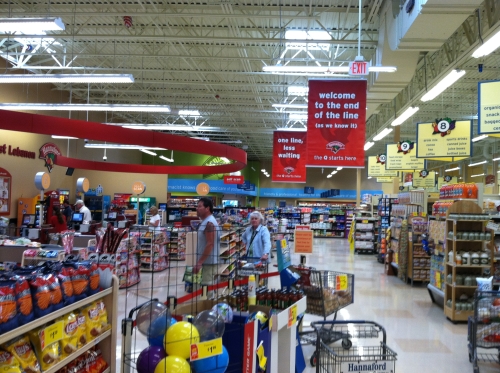I love self-service checkout, but it is again under attack. Here in Chicago, Jewel-Osco (one of the major local supermarket chains) is pulling self-service checkout lanes from some of its stores (Jewel scrapping self-checkout at some stores, Chicago Tribune, Sep 25). Their stated goal is to “reconnect personally with all of its customers.” Now the Wall Street Journal is piling on with an article declaring that computers just aren’t up for the job of letting people buy green beans (Humans 1, Robots 0, Oct 6).
The human supermarket checker is superior to the self-checkout machine in almost every way. The human is faster. The human has a more pleasing, less buggy interface. The human doesn’t expect me to remember or look up codes for produce, she bags my groceries, and unlike the machine, she isn’t on hair-trigger alert for any sign that I might be trying to steal toilet paper. Best of all, the human does all the work while I’m allowed to stand there and stupidly stare at my phone, which is my natural state of being. …
In a recent research paper called “Dancing With Robots,” the economists Frank Levy and Richard Murnane point out that computers replace human workers only when machines meet two key conditions. First, the information necessary to carry out the task must be put in a form that computers can understand, and second, the job must be routine enough that it can be expressed in a series of rules.
Supermarket checkout machines meet the second of these conditions, but they fail on the first. They lack proper information to do the job a human would do. To put it another way: They can’t tell shiitakes from Shinola. Instead of identifying your produce, the machine asks you, the customer, to type in a code for every leafy green in your cart. Many times you’ll have to look up the code in an on-screen directory. If a human checker asked you to remind him what that bunch of the oblong yellow fruit in your basket was, you’d ask to see his boss.
Let’s take this in two parts. First, if people prefer a conventional check out experience because that allows them to zone out then I have to wonder how Jewel’s plan to reconnect with its customers is going to work. I remember as a kid my mom having what seemed like endless conversations with cashiers. Of course, we were in a relatively small town and most of the women (they were virtually all woman) working the registers had either gone to high school with my mom or had a sibling who did. Now we live in a more class divided society. I suspect that none of the cashiers at my local Jewel are actually from the neighborhood or that the store’s staffing policies actually build in time for cashiers and customers to catch up on how their respective in-laws are doing.
But what of the claim that the information needed to run checkouts cannot be simply encoded for computers? (more…)
Read Full Post »

